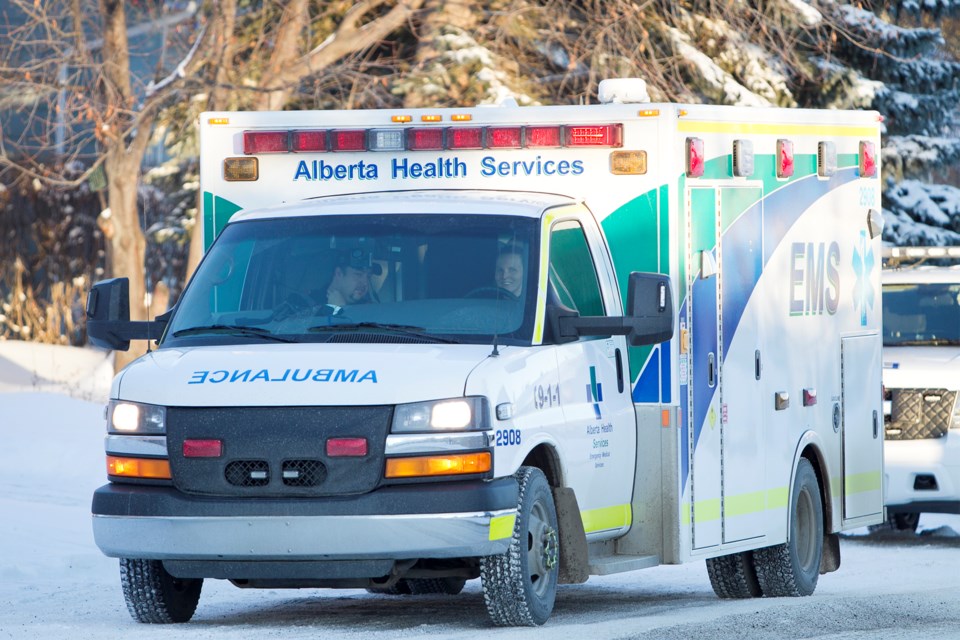A new multi-stakeholder committee will seek solutions to ongoing demand pressures on the province’s emergency medical services (EMS) system, announced Alberta Health Minister Jason Copping on Monday.
The provincial emergency medical services advisory committee will identify concerns and provide immediate and long-term recommendations to inform a new provincial EMS service plan, Copping said.
“We know that emergency medical services are facing unprecedented pressures right now,” Copping said during a press conference. “We don’t ever want to be in a position where we put other emergency services at risk to fill the gaps in our urgent medical care.
“We know the EMS system is seeing significant strain, which impacts service. We recognize this is a challenge and are taking immediate steps to improve emergency care access while we explore longer-term solutions.”
The province’s EMS system has seen a 30 per cent increase in 911 calls in recent months, due to the pandemic, the opioid crisis, busy emergency rooms, staffing challenges, global supply chain delays related to ambulance parts, and other factors, he said.
Critics say the UCP government needs to do much more to address staffing, response times and other concerns.
As well as the new committee, Copping also announced a new 10-point plan to add capacity to the EMS system and to address staff concerns.
The new advisory committee will be co-chaired by MLAs R.J. Sigurdson and Tracy Allard. Other members will include representatives from contract operators, Health Sciences Association of Alberta, as well as unions representing paramedics, municipalities and Indigenous communities.
The committee’s goal will focus on ensuring and improving emergency services while supporting EMS staff, said Sigurdson.
Darren Sandbeck is chief paramedic and senior provincial director, Emergency Medical Services, Alberta Health Services.
“The EMS system is under considerable pressure,” Sandbeck said during the press conference. “While we are doing our very best every day to be available for Albertans, demand has increase significantly and is now at historical levels.
“We really believe that the more folks we can get together on these issues the better the outcomes will be. The advisory panel will help us further engage individuals and groups and create a meaningful dialogue where we can collaboratively address these ongoing issues and pressures.”
The pandemic, the opioid crisis, and weather-related calls are among the situations driving up pressure on the emergency system, he said.
The new 10-point plan announced along with the committee includes measures already in the works and new initiatives.
The plan calls for hiring more paramedics, launching pilot projects to manage non-emergency inter-facility transfers, initiating an hours of work project to help ease staff fatigue, transferring low priority calls to other agencies, and stopping automatic dispatch of ambulances to motor vehicle collisions that don’t include injuries, a move that has been in effect since December.
Additional actions outlined in the plan include creating a new integrated operations centre in Calgary, evaluation by an emergency communications officer to determine if an ambulance from out-of-area is the most appropriate to respond, and allowing ambulances to be pre-empted from assignments instead of being automatically dispatched when a 911 call is received.
The new advisory committee will make its recommendations to the health minister by May.
The province also says it will be issuing a request for proposals to conduct a third-party review of the Alberta EMS dispatch system.
Following Monday’s announcement regarding the new committee and the 10-point plan, the official Opposition said the government needs to do more to alleviate pressure on the EMS system.
“Today’s comments from the UCP on the crisis they created in Alberta’s ambulance system offered no transparency, no targets, no timelines and no accountability,” said NDP health critic David Shepherd. “The crisis has been growing for some time, and it’s unacceptable that the UCP are so far behind on addressing it.”
The Health Services Association of Alberta represents paramedics and emergency communications officers.
In a press conference following Monday’s announcement, HSAA president Mike Parker said only “sustained increased funding (and) expanding our public health-care system” will address EMS pressures going forward.
“My focus throughout this process will be the health of Albertans and ensuring care is there when they need it. Every dollar needs to be spent one patient care; not profit for private contractors,” said Parker.



